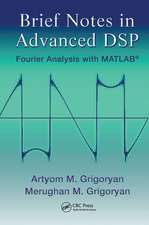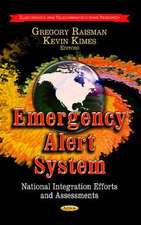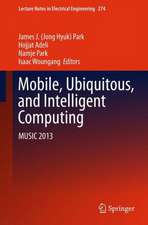Next Generation Mobile Broadcasting
Autor David Gómez-Barqueroen Limba Engleză Paperback – 16 noi 2016
This part includes a chapter about a common broadcast specification of state-of-the-art 3GPP and DVB standards to provide a broadcast overlay optimized for mobile and operated in conjunction with a broadband unicast access. It also contains an overview chapter on a new High-Efficiency Video Coding (HEVC) standard that is expected to provide significantly improved coding efficiency compared to current MPEG-4 AVC video coding.
The second part of the book—Next-Generation Handheld DVB Technology: DVB-NGH —describes the latest mobile broadcast technology known as Digital Video Broadcasting-Next-Generation Handheld (DVB-NGH), which is expected to significantly outperform all existing technologies in both capacity and coverage. DVB-NGH introduces new technological solutions that along with the high performance of DVB-T2 make DVB-NGH a powerful next-generation mobile multimedia broadcasting technology.
In fact, DVB-NGH can be regarded as the first 3G broadcasting system because it allows for the possibility of using multiple input multiple output MIMO antenna schemes to overcome the Shannon limit of single antenna wireless communications. DVB-NGH also allows the deployment of an optional satellite component forming a hybrid terrestrial-satellite network topology to improve coverage in rural areas where the installation of terrestrial networks is economically unfeasible. Although the commercial deployment of DVB-NGH is nowadays unclear after its standardization, it will be a reference point for future generations of digital terrestrial television technologies.
Edited by a member of the DVB-NGH standardization group, the book includes contributions from a number of standardization groups worldwide—including Digital Video Broadcasting (DVB) in Europe; Advanced Television Systems Committee (ATSC) in the US, Korea, Japan, and China; Third Generation Partnership Project (3GPP); and the Moving Picture Experts Group (MPEG).
| Toate formatele și edițiile | Preț | Express |
|---|---|---|
| Paperback (1) | 452.43 lei 6-8 săpt. | |
| CRC Press – 16 noi 2016 | 452.43 lei 6-8 săpt. | |
| Hardback (1) | 1137.60 lei 6-8 săpt. | |
| CRC Press – 26 mar 2013 | 1137.60 lei 6-8 săpt. |
Preț: 452.43 lei
Nou
Puncte Express: 679
Preț estimativ în valută:
86.60€ • 94.10$ • 72.79£
86.60€ • 94.10$ • 72.79£
Carte tipărită la comandă
Livrare economică 21 aprilie-05 mai
Preluare comenzi: 021 569.72.76
Specificații
ISBN-13: 9781138199781
ISBN-10: 1138199788
Pagini: 806
Ilustrații: 431
Dimensiuni: 156 x 234 x 41 mm
Greutate: 1.16 kg
Ediția:1
Editura: CRC Press
Colecția CRC Press
ISBN-10: 1138199788
Pagini: 806
Ilustrații: 431
Dimensiuni: 156 x 234 x 41 mm
Greutate: 1.16 kg
Ediția:1
Editura: CRC Press
Colecția CRC Press
Public țintă
Academic and Professional Practice & DevelopmentCuprins
Overview Papers. Overview DVB-NGH Commercial Requirements. Overview Limitations of DVB-T2 for the Provisioning of Mobile Services. Overview DVB-T2+M. Overview DVB-NGH. Overview DVB-NGH MIMO. Overview DVB-NGH Satellite. Overview DVB-NGH Phase2 (E-MBMS Aligned). Technical Solutions. System and Upper Layers. Constellation, Coding and Modulation. Framing, Sounding, and Synchronization. MIMO. Satellite.
Notă biografică
David Gómez-Barquero received a double M.Sc. degree in Telecommunications Engineering from the Universitat Politècnica de Valéncia (UPV), Spain, and the University of Gävle, Sweden, in 2004; and a Ph.D. in Telecommunications from UPV in 2009. During his doctoral studies he was a guest researcher at the Royal Institute of Technology, Sweden, the University of Turku, Finland, and the Technical University of Braunschweig, Germany. He also did an internship at Ericsson Eurolab, Aachen, Germany. During 2010 and 2011, he was a post-doc guest researcher at the Fraunhofer Heinrich Hertz Institute (HHI) in Berlin, Germany. During the second half of 2012, he was a visiting professor at the Sergio Arboleda University of Bogota, Columbia.
Dr. Gómez-Barquero is a Senior Researcher at the Institute of Telecommunications and Multimedia Applications (iTEAM) of UPV, where he leads a research group working on multimedia broadcasting, in particular in the optimization of 3GPP MBMS (Multimedia Broadcast Multicast Services) and especially DVB (Digital Video Broadcasting) systems. Since 2008, he has been actively participating in the digital television standardization forum DVB. He participated in the validation of the second generation digital terrestrial TV technology DVB-T2, and in the standardization processes of its mobile profile, known as T2-Lite, and its handheld evolution, known as DVB-NGH. He also contributed to the DVB-T2 implementation guidelines, and co-edited the DVB bluebook on upper layer forward error correction as an invited expert. He was also very involved in the promotion and adoption of DVB-T2 in Columbia.
Dr. Gómez-Barquero is a Senior Researcher at the Institute of Telecommunications and Multimedia Applications (iTEAM) of UPV, where he leads a research group working on multimedia broadcasting, in particular in the optimization of 3GPP MBMS (Multimedia Broadcast Multicast Services) and especially DVB (Digital Video Broadcasting) systems. Since 2008, he has been actively participating in the digital television standardization forum DVB. He participated in the validation of the second generation digital terrestrial TV technology DVB-T2, and in the standardization processes of its mobile profile, known as T2-Lite, and its handheld evolution, known as DVB-NGH. He also contributed to the DVB-T2 implementation guidelines, and co-edited the DVB bluebook on upper layer forward error correction as an invited expert. He was also very involved in the promotion and adoption of DVB-T2 in Columbia.
Descriere
This book provides an overview of the past, present, and future in mobile multimedia broadcasting. The first part supplies an overview of the new generation mobile broadcasting technologies currently available. The second part describes the cutting-edge mobile broadcast technology known as DVB-NGH (Digital Video Broadcasting–Next Generation Handheld), which is expected to significantly outperform existing technologies in capacity and coverage. The book is edited by a member of the DVB-NGH standardization group, and contains contributions from the different standardization groups worldwide.



























